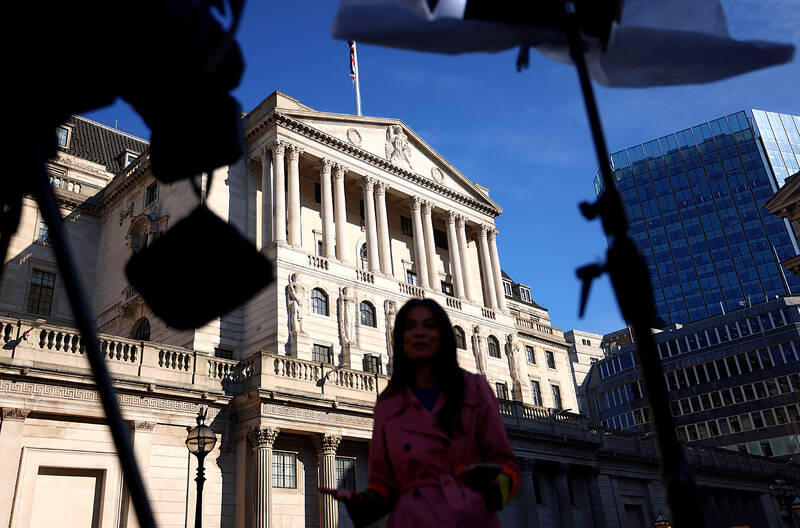The Bank of England kept its key interest rate at 4.5 percent yesterday, as it warned of “a lot of economic uncertainty” caused largely by US President Donald Trump’s tariffs.
The bank left borrowing costs at 4.5 percent, opting against a fourth cut in seven months despite stagnant UK economic growth as inflation stays elevated.
On Wednesday, the US Federal Reserve and Bank of Japan held borrowing costs steady, while Switzerland’s central bank trimmed rates yesterday.

Photo: Andy Rain, EPA-EFE
“There’s a lot of economic uncertainty at the moment,” Bank of England Governor Andrew Bailey said in a statement. The bank noted in minutes of a regular policy meeting that “global trade policy uncertainty has intensified.”
“Other geopolitical uncertainties have also increased and indicators of financial market volatility have risen globally. “The German government has announced plans for significant reform to its fiscal rules,” the central bank said.
Bailey added that the bank still thinks “that interest rates are on a gradually declining path.”
Analysts said this indicated, as expected, that the bank would cut at its next regular monetary policy meeting in May.
Official data released yesterday showed that while British unemployment steadied at the start of the year, wages growth remains far above the annual inflation rate.
At the same time, the consumer price index jumped more than expected to 3.0 percent in January, which is above the central bank’s two-percent target.
The UK economy meanwhile unexpectedly shrank in January.
“We’ve had three rate cuts since the summer, but there’s still work to do to ease the cost of living,” British Chancellor of the Exchequer Rachel Reeves said in reaction to the latest central bank decision, backed by eight of the Monetary Policy Committee’s nine policymakers, including Bailey.
Last month, the central bank halved its forecast for the UK’s total output this year, blaming global risks amid US tariff threats and deteriorating UK business confidence.
That came as the central bank last month cut its key interest rate by a quarter point, easing slightly the pressure on the UK government, which is struggling with tight public finances.

TARIFFS: The global ‘panic atmosphere remains strong,’ and foreign investors have continued to sell their holdings since the start of the year, the Ministry of Finance said The government yesterday authorized the activation of its NT$500 billion (US$15.15 billion) National Stabilization Fund (NSF) to prop up the local stock market after two days of sharp falls in reaction to US President Donald Trump’s new import tariffs. The Ministry of Finance said in a statement after the market close that the steering committee of the fund had been given the go-ahead to intervene in the market to bolster Taiwanese shares in a time of crisis. The fund has been authorized to use its assets “to carry out market stabilization tasks as appropriate to maintain the stability of Taiwan’s

STEEP DECLINE: Yesterday’s drop was the third-steepest in its history, the steepest being Monday’s drop in the wake of the tariff announcement on Wednesday last week Taiwanese stocks continued their heavy sell-off yesterday, as concerns over US tariffs and unwinding of leveraged bets weighed on the market. The benchmark TAIEX plunged 1,068.19 points, or 5.79 percent, to 17,391.76, notching the biggest drop among Asian peers as it hit a 15-month low. The decline came even after the government on late Tuesday authorized the NT$500 billion (US$15.2 billion) National Stabilization Fund (國安基金) to step in to buoy the market amid investors’ worries over tariffs imposed by US President Donald Trump. Yesterday’s decline was the third-steepest in its history, trailing only the declines of 2,065.87 points on Monday and

TARIFF CONCERNS: The chipmaker cited global uncertainty from US tariffs and a weakening economic outlook, but said its Singapore expansion remains on track Vanguard International Semiconductor Corp (世界先進), a foundry service provider specializing in producing power management and display driver chips, yesterday withdrew its full-year revenue projection of moderate growth for this year, as escalating US tariff tensions raised uncertainty and concern about a potential economic recession. The Hsinchu-based chipmaker in February said revenues this year would grow mildly from last year based on improving supply chain inventory levels and market demand. At the time, it also anticipated gradual quarter revenue growth. However, the US’ sweeping tariff policy has upended the industry’s supply chains and weakened economic prospects for the world economy, it said. “Now

An employment discrimination lawsuit against contract chipmaker Taiwan Semiconductor Manufacturing Co (TSMC, 台積電) might soon be expanded after a hearing in a federal court in San Jose, California, on Tuesday to add 15 plaintiffs to the case. According to a court document, the lawsuit, which was refiled in November last year as a form of a class action with 13 plaintiffs in California, wants to add 15 plaintiffs from Arizona, where TSMC is building up its wafer fab capacity. TSMC first committed between 2020 and last year to invest US$65 billion in three advanced wafer fabs in Arizona. It then pledged an